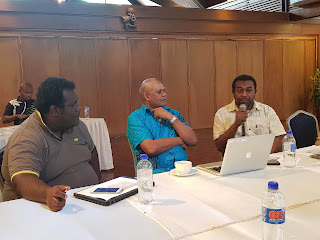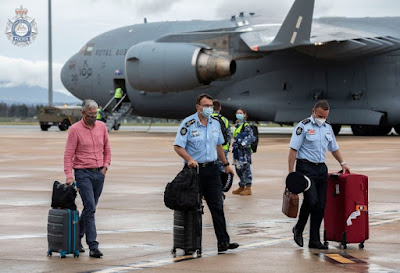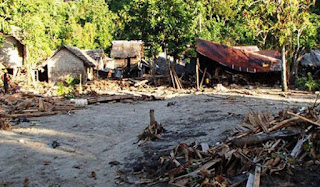MSG SUPPORTS FOREST PROTECTION
BY GEORGINA KEKEA
APART from felling trees and exporting logs and timber, there are other lucrative ways to make money says Stanley Wapot Program Manager Sustainable Development of the MSG Secretariat.
Wapot says countries like Solomon Islands and Papua New Guinea can earn money in the tourism sector, like their fellow MSG members Vanuatu and Fiji.
Recently Wapot was in Honiara for a consultation with stakeholders and Forest agencies to discuss how they can work together to protect the country’s forest.
 |
| Wapot with fellow colleagues from MSG & SPREP |
Wapot says
the Secretariat believes that Forests of Melanesia are vital natural asset that
supports the livelihoods of the majority of the people who are rural based
subsistence farmers.
But while the
programme seeks to save the country’s forest, on the other hand, forestry
sector brings in a lot of money for the government.
“PNG and
Solo are the same in the Melanesian countries but we have options too where we
can make money out of our resources. Agriculture sector or non-timber products.
Timber is not the only source of income” Wapot says.
Currently more than 100 logging companies are in operation in Solomon Islands, with most operations carried out said to be unsustainable.
“Suppose you look at Fiji and Vanuatu, they are prioritizing tourism. They do not cut timber or involve in mining. They work really hard in the tourism sector and that’s where they get their money from and it goes straight to the local people. Solomon Islands has a huge potential for tourism.”
Wapot says there is money through forestry but it is not sustainable.
He said tourism and agriculture are the two most important sectors that the country needs to focus in.
However, Wapot says the most important thing to consider as well is people’s attitude and behavior.
He says this is why Solomon Islands and PNG might lag behind in tourism and agriculture.
Wapot says they are looking at two sites in the Solomon Islands to conserve and they are working closely with local groups to identify areas to conserve.
He says this is why the discussions they have in the country is important towards MSG’s goal of preservation of forests for MSG member countries.
“I believe, sometimes we under estimate our people in the rural area. Though they might not have good education in the classroom, their knowledge and way of doing things had been around for a long time. It is the educated people that had brought in new ideas that ruined our people’s forests and thoughts. They have managed to live sustainably in their communities till now. Why not give them a chance to try and learn about preservation of our forests?”
The Forests
in Melanesia are said to provide a full range of services – including wildlife
and plant habitat, food, medicines, fresh water, clean air, carbon
sequestration, timber, fuel wood, flood regulation and erosion control, nutrient
cycling, climate regulation, aesthetic and spiritual values.
The MSG
Secretariat is working in partnership with Griffith University of Australia for
the last six years.
Griffith
University contributes mainly technical assistance to the Sustainable Development
Programme of the Secretariat.
ENDS///




Comments
Post a Comment